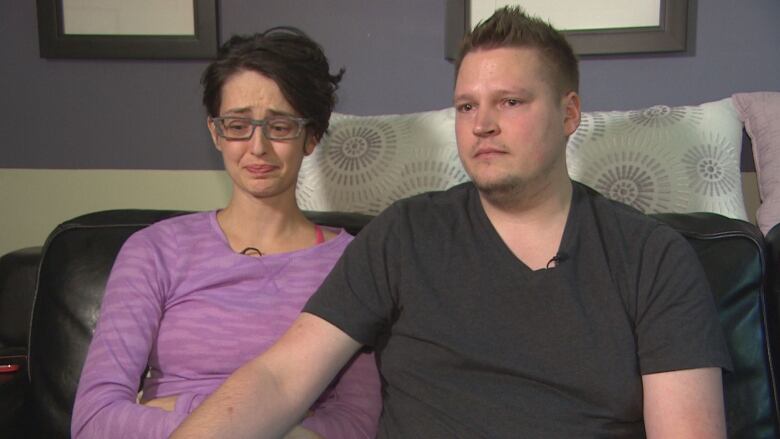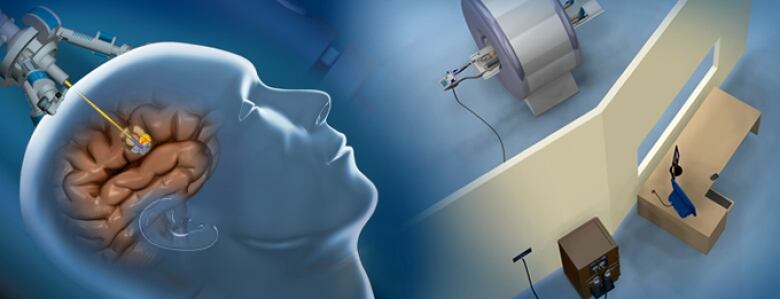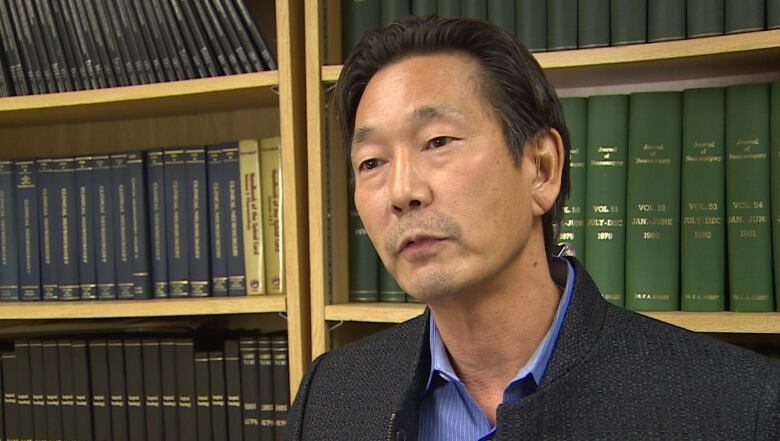Winnipeg woman with brain cancer looks to U.S. to get Manitoba-developed surgery
'Im willing to fight,' says Anastasie Hacault, diagnosed with incurable brain cancer 5 years ago

A laser-based brain surgery developed by Winnipeg researchers could help prolong Anastasie Hacault's life, but she says she'll have to spend thousands of dollars in the U.S. to get it.
"I'm willing to fight as long as it takes, I just need the tools," said 32-year-old Hacault."I've been buying time."
She was diagnosed with brain cancer in 2012 and given three-to-five years to live. It happened just asshe was getting to know Phil Kaehler, who would become her husband in 2016.
"On our second date, she told me that she did have a brain tumour," said Kaehler, 32."That was hertelling me if I wanted to run away, I could. But I wasn't going to because she's an amazing woman ... she's been so strong."
Hacault has undergone surgeries, radiation and chemotherapy in recent years that haveenabled her to keep working at her job in agricultural services and maintain a relatively normal life.
But this May, things started to take a turn for the worse. The tumour on the right side of her brain began to swell, causing her to lose mobility on the left side of her body.
"I lost the ability to really walk, I can't type anymore," she said.

Hacaultand Kaehler,wholearned the procedure could cost about$150,000,are banking on a GoFundMecampaign to cover the cost of a proceduresouth of the border.
The online fundraiser, launched July 10, hadraised nearly $63,000 as of Tuesday night.Apart from raising enough money,Hacault'scondition muststablizebefore they can take a plane south.
'Perfect candidate'
The NeuroBlatelaser-based method was created by Mark Torchiaand Richard Tyc of the University of Manitoba. It allows surgeons to target tumours in hard-to-reach areas of the brain with precision.
Kaehler said the nature of his wife's tumour makes her a "perfect candidate"for NeuroBlate, and that her doctors believe a traditional surgical method would almost certainly paralyze her.
The problem isit is no longer offered by any hospitals or clinics in Canada.
Neuroblate was used on27 patients at the Vancouver General Hospital dating back to 2014, a spokesperson with Vancouver Coastal Health said in an emailed statement.
The couplespoke with B.C. neurosurgeonDr. Brian Toyotaat the end of June about receiving the surgery. Toyota has used NeuroBlate on patients in the pastbut said it's no longer available, Hacaultsaid.

"That's when he said it had actually gotten shut down a couple weeks before," Kaehler said. "It was heartbreaking for us."
Vancouver Coastal Health is currently exploring ways to keep using the laser treatment.
"It is our hope that the collection of more data in a clinical trial setting will provide a more definitive evaluation for the therapy and the benefits to patients," the spokesperson said, adding the health authority also needs to find a stable funding source.
'Pricey' procedure
Neil Berrington, a neurosurgeon with the Winnipeg Regional Health Authority and a U of M professor, said there are a couple of reasons thereisn't a NeuroBlate laser installed in any Winnipeg hospitals.
"There's relatively few patients who would have strong indications to have the procedure done, and secondly the device and the disposable is pricey," he said.
"So if you want to be responsible and practise cost-effective medicine, it's probably in your interest to have those patients treatedelsewherefor the moment."
Berrington said Canadian patients tend to be referredto a clinic in Cleveland, Ohio,that is actively performing "a lot of these" surgeries.
"Our only other option is the U.S. and they have multiple sites there,"Kaehlersaid, adding a spokesperson with Manitoba Health's out-of-province benefits programhas asked for a referral letter from Hacault'sdoctors.
"We have to wait for the game plan here to take effect. Hopefully there's some coverage."
Bring it home
His wife'scancer, known as ananaplasticastrocytomatumour, doesn't have a cure butthe couple is confident the procedure could prolong and improveHacault'squality of life.
If nothing else, the couple hopes their battle to access the procedure could pave the way to help someone else down the road.Hacault said she doesn't want anyone elseto go through the uncertainty she is currently experiencing.
"I would really like this to be the only case of this happening in Canada," she said."We need to get a program started in Canada."
With files from Radio-Canada and Janice Grant












_(720p).jpg)


 OFFICIAL HD MUSIC VIDEO.jpg)
.jpg)



























































































